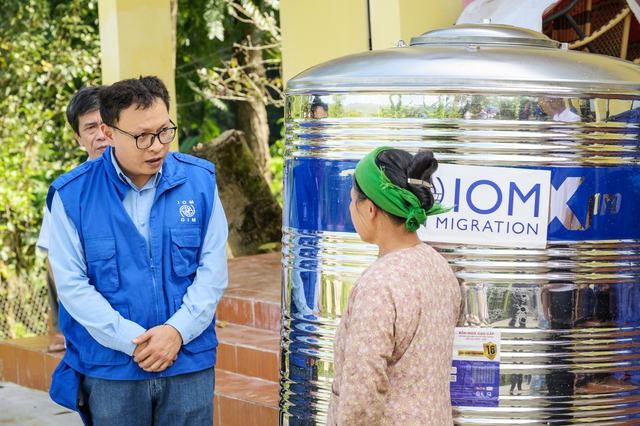Japan provides US$2 million in urgent support for Viet Nam's Typhoon Yagi relief efforts
VGP - In the aftermath of Super Typhoon Yagi, the Government of Japan has announced a US$2 million contribution to the International Organization for Migration (IOM) and the United Nations Children’s Fund (UNICEF) to support Viet Nam’s critical relief and early recovery efforts.

IOM staff supports people living in areas seriously affected by Typhoon Yagi - Photo: IOM
Of the figure, US$1 million will cover essential water, sanitation, hygiene (WASH) and child protection services provided through UNICEF Viet Nam serving 21,251 people, and the other US$1 million will go to IOM Viet Nam to provide emergency shelter and non-food items support for more than 16,800 individuals in hardest hit provinces.
Japanese Ambassador to Viet Nam Ito Naoki said, the Government of Japan intends to ensure that this funding will support the recovery amongst some of Viet Nam's most vulnerable communities in hard-hit rural areas.
This holistic approach of humanitarian assistance through trusted partners also will hopefully set a strong course for recovery. It is now more important than ever that we work quickly to achieve our collective vision of a strong, prosperous, and resilient Viet Nam, he emphasized.
This contribution will help address the urgent needs of children and families affected by the most destructive typhoon to hit the country in 70 years. With widespread destruction across the northern provinces, the typhoon killed more than 300 people and destroyed or damaged more than 100,000 homes, schools and healthcare facilities. Over 237,000 families have been displaced, an estimated 570,000 people lack access to safe water and sanitation, and child protection risks have been exacerbated.
This funding will also play a catalytic role in facilitating broader multi-sectoral coordination, enhancing efforts across shelters, health, education, and nutrition services to meet the comprehensive needs of children and families.
As part of the United Nations' (UN) joint plan in cooperation with the Government of Viet Nam, UNICEF and IOM are focused on supporting the most vulnerable children and families, including those who have been displaced.
Despite all relief efforts, further support is essential to ensure safe spaces and access to essential services for affected populations. The funds provided by Japan will enable IOM and UNICEF to expand their reach and accelerate recovery efforts.
The Government of Japan's contribution will also address gender-based vulnerabilities by supporting the repair of sanitation facilities, improving lighting in evacuation centers, and promoting the safety of women and girls through targeted interventions.
Welcoming Japan's contribution, Mitsue Pembroke, Officer in Charge of IOM Viet Nam said, through the Viet Nam Disaster Risk Reduction Partnership together with provincial and local authorities and actors, IOM will ensure coordinated efforts to support the most vulnerable individuals displaced from their homes, especially the economically marginalized, women, girls and persons with disabilities.
Japan and Viet Nam have a long-standing partnership. To date, the Japanese government has provided emergency relief, including water purifiers and plastic sheets for 2,000 families through the Japan International Cooperation Agency (JICA), as well as other emergency supplies through the ASEAN Humanitarian Assistance Center (AHA Center) and UNICEF.
Moreover, in terms of disaster prevention, Japan has experienced many natural disasters and has a wealth of knowledge. From the perspective of disaster prevention measures, Japan has cooperated with Viet Nam in the past and will continue to do so.
With Japan's support, UNICEF and IOM are committed to helping families in northern Viet Nam rebuild their lives after this catastrophic climate event. Continued international support is vital as communities recover from the destruction of this deadly typhoon and work to build resilience against future natural disasters./.
